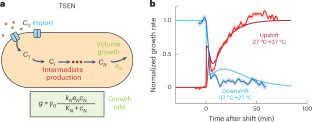How microbial growth adapts to temperature shifts
IF 20.5
1区 生物学
Q1 MICROBIOLOGY
引用次数: 0
Abstract
Researchers show that the dynamics of metabolomic rearrangement dictate the growth response of bacteria and fungi to rapid changes in temperature. Single-cell microscopy revealed a mechanism for transient memory of previous temperatures and indicated that these responses are generally conserved, advancing our understanding of microbial behaviour in fluctuating environments.


微生物是如何适应温度变化的
研究人员表明,代谢组学重排的动态决定了细菌和真菌对温度快速变化的生长反应。单细胞显微镜揭示了对先前温度的短暂记忆机制,并表明这些反应通常是保守的,这促进了我们对波动环境中微生物行为的理解。
本文章由计算机程序翻译,如有差异,请以英文原文为准。
求助全文
约1分钟内获得全文
求助全文
来源期刊

Nature Microbiology
Immunology and Microbiology-Microbiology
CiteScore
44.40
自引率
1.10%
发文量
226
期刊介绍:
Nature Microbiology aims to cover a comprehensive range of topics related to microorganisms. This includes:
Evolution: The journal is interested in exploring the evolutionary aspects of microorganisms. This may include research on their genetic diversity, adaptation, and speciation over time.
Physiology and cell biology: Nature Microbiology seeks to understand the functions and characteristics of microorganisms at the cellular and physiological levels. This may involve studying their metabolism, growth patterns, and cellular processes.
Interactions: The journal focuses on the interactions microorganisms have with each other, as well as their interactions with hosts or the environment. This encompasses investigations into microbial communities, symbiotic relationships, and microbial responses to different environments.
Societal significance: Nature Microbiology recognizes the societal impact of microorganisms and welcomes studies that explore their practical applications. This may include research on microbial diseases, biotechnology, or environmental remediation.
In summary, Nature Microbiology is interested in research related to the evolution, physiology and cell biology of microorganisms, their interactions, and their societal relevance.
 求助内容:
求助内容: 应助结果提醒方式:
应助结果提醒方式:


